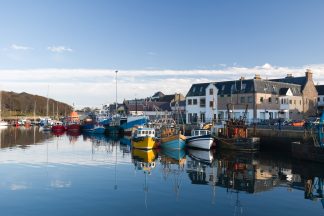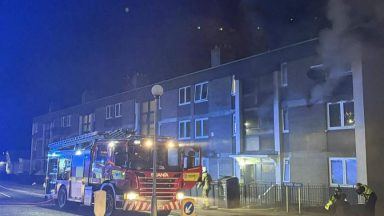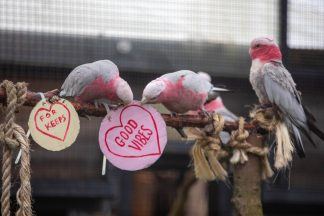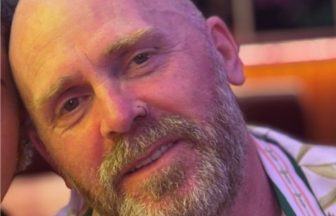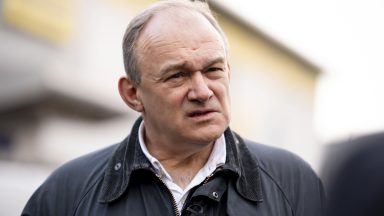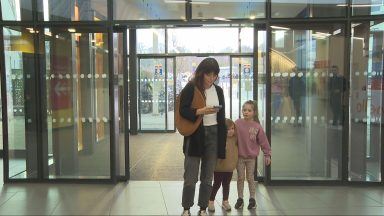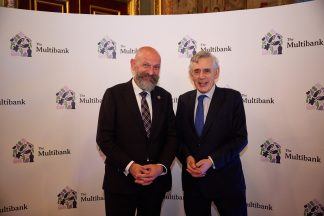The families who worked tirelessly to ban handguns in the UK after the Dunblane massacre have reflected on the campaign 27 years on.
There were 16 children and their teacher killed at Dunblane Primary School in the worst mass murder of its kind ever committed in Britain.
More than 700,000 signed the landmark Snowdrop petition which led to the government banning the private possession of handguns in 1998.
The campaign to ban private handgun ownership was named after the only flower blooming in Scotland at the time of the shooting.
Ann Pearston was one of three mothers who launched the Snowdrop campaign in the wake of the atrocity, advocating for the grieving families who were unable to speak.

News coverage in the Sunday Times prompted the mum-of-three to contact the editor, who mentioned the possibility of launching a public petition.
From there, the seeds of the Snowdrop campaign were sown.
Mrs Pearston told STV News: “We were just mums, we didn’t know anything about guns and firearms legislation.
“I wasn’t political and I didn’t even know who my MP was. I didn’t know what the Scottish grand committee was.
“You know as a mum of three children under six, you were watching Neighbours not Newsnight. But when you do become aware, you get incensed about something then I think women have quite a powerful force and can contribute.”

Mrs Pearston became a leading voice for the campaign which saw her address the Labour Party conference, research and write reports and deal with constant press enquiries.
She recalled it taking half an hour to download voice messages from the phone answer machine and a further two hours to respond to the messages.
“We were in a pre-digital, pre-internet time, pre social media time,” she added. “There were people over the signing table that we would debate with them for quarter of an hour and they might sign it or they might not.
“That was their choice. We put forward the arguments as we were learning about them.”
Legislation banning all civilian handguns in the UK finally came into force in February 1998.
“I think back on that time and I can’t actually remember how I felt when we achieved our goal,” Mrs Pearston said. “I think that must have been because we were just exhausted.
“Obviously I must have been really pleased. It was like climbing up a mountain and the total ban on handguns was the cairn at the top.

“You start off on the gentle slopes then hit the rocky, steep bits, false summits and then you see the cairn at the top, you’re at the summit and you push to get there and touch it then all you want to do is rest and breathe.”
At the Dunblane Centre, families, officials and the local community gathered to celebrate the success of the campaign.
Mrs Pearston added: “None of us meet very often and tonight it’s just joyful to meet them and see smiles on their faces.
“It was horrendous that it took what happened in Dunblane Primary school for us to wake up as a country as to where we were going in relation to firearms.
“We all thought this country was very safe and after Dunblane, we all strode to make it safer.”
Martyn Dunn, whose five-year-old daughter Charlotte was killed in the shooting, shared a photograph of his little girl aged three with snowdrop motifs on her coat.

“When the Snowdrop campaign started, I would look at this picture and think ‘she is here with us, supporting us all the way’ – and she did a very good job.”
He recalled they were among the last of the families who learned they had lost their children in the tragic shooting.
“It was nearly 3 o’clock in the afternoon and they had put us in a teacher’s area in the school to wait all that time. Then we were called in and given the bad news,” he said.
Mr Dunn said the pain of losing his child and accepting he never got to see her grow up will never go away.
He added: “One of the things that was very hard for me was that I would never be able to give her away at her wedding. A family friend did ask me to give her away so I really appreciated that and it was very nice.
“We are never going to forget. It’s there and it has caused us difficulty some times but she is always in our memories and is with us.”
Mick North, the father of Sophie, got involved with Snowdrop at the launch of the campaign.
“They were getting our support behind the scenes as at first we couldn’t speak to the media because the public inquiry was going on.

“Once we were able to tell the British public how we felt, we were in total agreement with what the campaigners had already started.”
He added: “One of the things that concerns me is that politicians will say often say we have the toughest gun laws in Britain as if it was them who spontaneously made it happen.
“They weren’t changing the gun laws at the time, it took an event like Dunblane and it took dedicated volunteers and campaigners to get that change in the law.
“I think that is something we have to remind politicians and the public about.
“We shouldn’t have to wait for events as horrible as Dunblane before change is made.”
Five-year-old Emma Crozier was one of those killed in the tragedy.
Her sister Ellie told STV news: “The work the parents did is incredible. The fact is that I’m here alive, my sister isn’t.

“We lived in two very different worlds, I was born a year after she died. She didn’t make it to six years old.
“I’ve graduated school, I’ve fallen in love, I’ve had my heart broken, I have friends and a job that I love. Im safe because of the work that the Dunblane community did after the shooting.”
She added: “When you forget history, you are doomed to repeat it. When we come together to remember the Dunblane legacy, we should remember the work that the parents put in because it was work.
“They should have had space and time to grieve their children but they pushed through and they passed some really important legislation that means that Scotland and the UK has some of the lowest gun crime rates.
“Thoughts and prayers are useless, particularly to dead children. You can think of families and be kind but at the end of the day, honouring with action is how you save lives and stop other people being killed.
“That is how I want to honour Emma’s memory to make sure that no other children are harmed in the same way.”
Donna Dees, who led the Million Mom March for gun control in the US in 2000, is in Scotland for the first time to meet those involved in the Snowdrop campaign.
Three mothers of children killed in the Dunblane massacre spoke at the rally in Washington, which remains one of the largest protests against gun violence in U.S history.

“They spoke first at the march and I truly believe they helped to inspire some momentum,” she said.
“Those involved in the campaign told me they saw it like a relay race for them. The three mums got it going and when they got exhausted, the Dunblane families were ready to pick it up and then others followed.
“We have got to learn how to keep that momentum going and that is the message I’m going to be taking back home.
“Despite the current situation in the states, I do remain optimistic. The action taken by young people gives me hope.”
Follow STV News on WhatsApp
Scan the QR code on your mobile device for all the latest news from around the country








